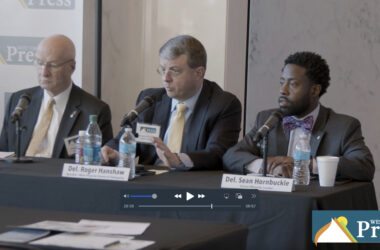By JESS MANCINI
The Intelligencer/Wheeling News-Register
PARKERSBURG, W.Va. — An oil and gas industry group is changing its approach for the West Virginia Legislature’s upcoming session on bills promoting Marcellus and Utica shale drilling.
 Rather than pushing for a bill allowing forced pooling, as the group has done in recent years, the West Virginia Oil and Natural Gas Association will focus on two proposals, joint development and co-tenancy, Anne Blankenship, executive director of the association, said Tuesday. The Legislature’s session begins today in Charleston.
Rather than pushing for a bill allowing forced pooling, as the group has done in recent years, the West Virginia Oil and Natural Gas Association will focus on two proposals, joint development and co-tenancy, Anne Blankenship, executive director of the association, said Tuesday. The Legislature’s session begins today in Charleston.Joint development would allow companies to drill for natural gas on property adjoining land where the owners have agreed to lease mineral rights, which takes advantage of horizontal drilling techniques, Blankenship said.
Under co-tenancy, companies would need a simple majority, 51 percent, of the owners to drill rather than 100 percent of all owners, she said. It involves a single property, not a group, Blankenship said.
“It is not forced pooling,” she said.
Forced pooling, in a 2016 version of the legislation, would have allowed a company which owns or has leased the rights to 80 percent of the acreage in the proposed unit to drill for gas. It and previous versions of legislation related to forced pooling have been opposed by the West Virginia Farm Bureau.
“That bill was not a good bill in our eyes,” said Steve Butler, executive director of the West Virginia Farm Bureau, noting at first glance, the new proposals seem to be similar to the 2016 legislation, Senate Bill 383.
“It kind of looks like they’re putting lipstick on the same pig,” Butler said.
The farm bureau has worked with the industry in the past to come up with legislation mostly agreeable to both sides, Butler said. A bill in 2015 failed on a 49-49 vote in the House of Delegates.
Scott Windom, an attorney in Harrisville who represents owners and small producers, said the association is taking the previous forced pooling legislation that was unsuccessful in the Legislature and splitting it into separate bills. The legislation does not protect property owners, he said.
“We need to protect property rights,” Windom said.
The issue with co-tenancy is an owner with a minority share of the mineral rights to a property has no say in what the majority wants, Windom said. A minority owner with a greater understanding and knowledge of industry standards could be subject to a deal made by a less-knowledgeable majority, Windom said.
“They’re not going to get the benefit of that knowledge,” he said.
Out-of-state companies are attempting to change the laws that have been in place for 100 years, Windom said. Also, existing law requires 100 percent of the owners to agree to a lease, but there also are provisions in state code if owners can’t be located, he said.
See more from The Intelligencer/Wheeling News-Register




